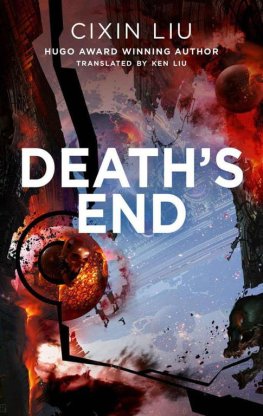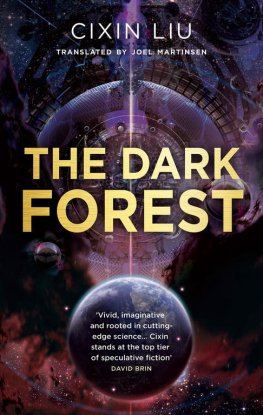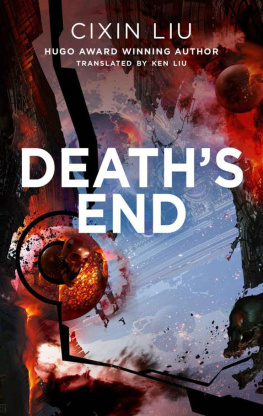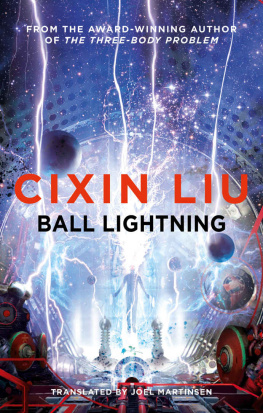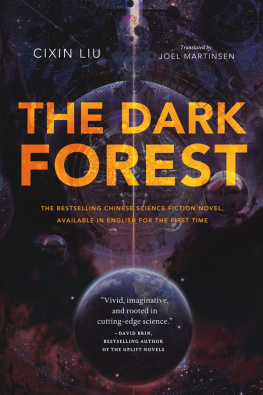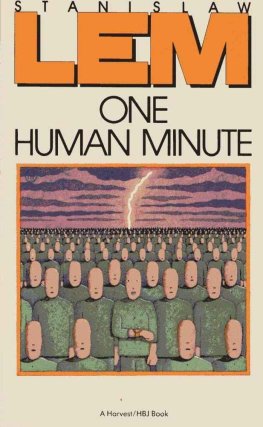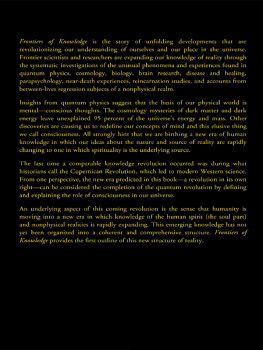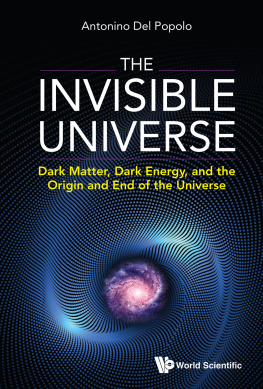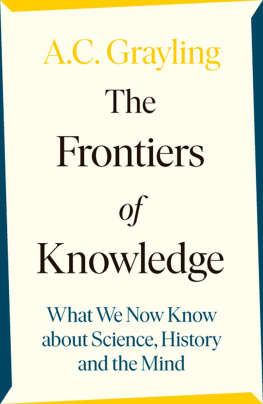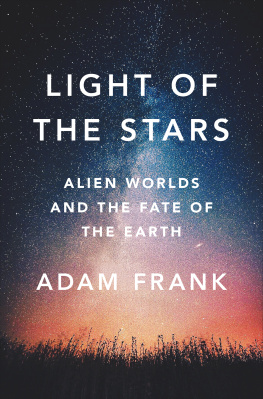A Brief Note from the Translator
Chinese and Korean names in this text are rendered with surnames first and given names last, in accordance with the customs of these cultures. For example, in the name Yun Tianming, YUN is the surname and TIANMING is the given name.
CHARACTERS FROM
THE THREE-BODY PROBLEM AND
THE DARK FOREST(Chinese names are written with surname first.)Ye Wenjie
Physicist whose family was persecuted during the Cultural Revolution. She initiated contact with the Trisolarans and precipitated the Trisolar Crisis.
Yang Dong
Physicist; daughter of Ye Wenjie.
Ding Yi
Theoretical physicist and the first human to make contact with the Trisolaran droplets; Yang Dongs boyfriend.
Zhang Beihai
Officer in the Asian Fleet who hijacked Natural Selection during the Doomsday Battle, thus preserving a flicker of hope for humanity during their darkest hour. Possibly one of the first officers to understand the nature of dark battles.
Secretary General Say
UN secretary general during the Trisolar Crisis.
Manuel Rey Diaz
Wallfacer; he proposed the giant hydrogen bomb plan as a defense against the Trisolarans.
Luo Ji
Wallfacer; discoverer of the dark forest theory; creator of dark forest deterrence.
Common Era Present201X C.E.
Crisis Era 201X2208
Deterrence Era 22082270
Post-Deterrence Era 22702272
Broadcast Era 22722332
Bunker Era 23332400
Galaxy Era 2273unknown
Black Domain Era for DX3906 System 268718906416
Timeline for Universe 647 18906416
Excerpt from the Preface to A Past Outside of Time
I suppose this ought to be called history; but since all I can rely on is my memory, it lacks the rigor of history.
Its not even accurate to call it the past, for the events related in these pages didnt occur in the past, arent taking place now, and will not happen in the future.
I dont want to record the details. Only a frame, for a history or an account of the past. The details that have been preserved are already abundant. Sealed in floating bottles, they will hopefully reach the new universe and endure there.
So Ive written only a frame; someday, the frame may make it easier to fill in all the specifics. Of course, that task wont fall to us. I just hope such a day will come for someone.
I regret that day didnt exist in the past, doesnt exist in the present, and will not exist in the future.
I move the sun to the west, and as the angle of the light shifts, the dewdrops on the seedlings in the field glisten like countless eyes suddenly popping open. I dim the sun so that dusk arrives earlier; then I stare at the silhouette of myself on the distant horizon, in front of the setting sun.
I wave at the silhouette; the silhouette waves back. Looking at the shadow of myself, I feel young again.
This is a lovely time, just right for remembering.
May 1453, C.E. The Death of the Magician
Pausing to collect himself, Constantine XI pushed away the pile of city-defense maps in front of him, pulled his purple robe tighter, and waited.
His sense of time was very accurate: The tremor came the moment he expected it, a powerful, violent quake that seemed to originate from deep within the earth. The vibrating silver candelabra hummed, and a wisp of dust that had sat on top of the Great Palace for perhaps a thousand years fell down and drifted into the candle flames, where the motes exploded in tiny sparks.
Every three hoursthe time it took the Ottomans to reload one of the monstrous bombards designed by the engineer Orbantwelve-hundred-pound stone balls battered the walls of Constantinople. These were the worlds strongest walls: first built by Theodosius II during the fifth century, they had been continually reinforced and expanded, and were the main reason that the Byzantine court had survived so many powerful enemies.
But the giant stone balls now gouged openings into the walls with each strike, like the bite of an invisible giant. The emperor could imagine the scene: While the debris from the explosion filled the air, countless soldiers and citizens rushed onto the fresh wound in the walls like a swarm of brave ants under a sky full of dust. They filled in the break with whatever was at hand: bits and pieces taken from other buildings in the city, flaxen-cloth bags of earth, expensive Arabic carpets. He could even imagine the cloud of dust, steeped in the light of the setting sun, drifting slowly toward Constantinople like a golden shroud.
During the five weeks the city had been under siege, these tremors had come seven times a day, spaced as regularly as the strokes of some colossal clock. This was the time and rhythm of another world, the time of heathens. Compared to these tremors, the ringing of the double-headed eagle copper clock in the corner that represented the time of Christendom seemed feeble.
The tremors subsided. After a while and with an effort, Emperor Constantine pulled his thoughts back to the reality before him. He gestured to let the guard know that he was ready for his visitor.
Phrantzes, one of the emperors most-trusted ministers, came in with a slender, frail figure trailing close behind.
This is Helena. Phrantzes stepped aside, revealing the woman.
The emperor looked at her. The noblewomen of Constantinople tended to favor clothes bedecked with elaborate decorative elements, while the commoners wore plain, shapeless white garments that draped to the ankles. But this Helena seemed a combination of both. Instead of a tunic embroidered with gold thread, she wore a commoners white dress, but over it she draped a luxurious cloak; however, instead of the purple and red reserved for the nobility, the cloak was dyed yellow. Her face was enchanting and sensual, bringing to mind a flower that would rather rot in adoration than fade in solitude.
A prostitute, probably one who did rather well for herself.
Her body trembled. She kept her eyes lowered, but the emperor noticed that they held a feverish glow, hinting at an excitement and zeal rare for her class.
You claim the powers of magic? the emperor asked.
He wanted to conclude this audience as quickly as possible. Phrantzes was usually meticulous. Of the approximately eight thousand soldiers defending Constantinople now, only a small number came from the standing army, and about two thousand were Genoese mercenaries. Phrantzes had been responsible for recruiting the rest, a few at a time, from the citys inhabitants. Though the emperor wasnt particularly interested in his latest idea, the capable ministers standing demanded that he at least be given a chance.
Yes, I can kill the sultan. Helenas quiet voice quivered like silk strands in a breeze.
Five days earlier, standing in front of the palace, Helena had demanded to see the emperor. When guards tried to push her away, she presented a small package that stunned the guards. They werent sure what she was showing them, but they knew it was not something she should have possessed. Instead of being brought to the emperor, she had been held and interrogated about how she had acquired the item. Her confession had been confirmed, and she was then brought to Phrantzes.
Phrantzes now took out the small bundle, unwrapped the flax cloth, and placed the contents on the emperors desk.
The emperors gaze was as stupefied as those of the soldiers five days ago. But unlike them, he knew immediately what he was looking at.
More than nine centuries earlier, during the reign of Justinian the Great, master craftsmen had cast two chalices out of pure gold, studded with gems and glowing with a beauty that seized the soul. The two chalices were identical save for the arrangement and shapes of the gems. One of the two was kept by successive Byzantine emperors, and the other one had been sealed along with other treasures into a secret chamber in the foundation of Hagia Sophia in 537 C.E., when the great church was rebuilt.

